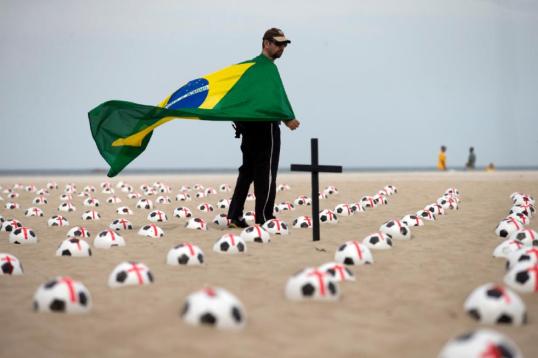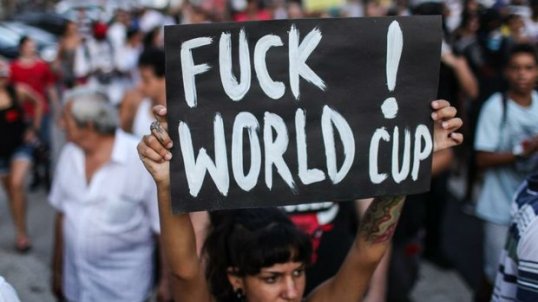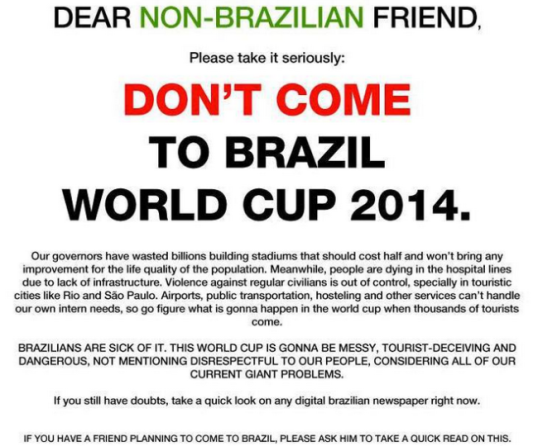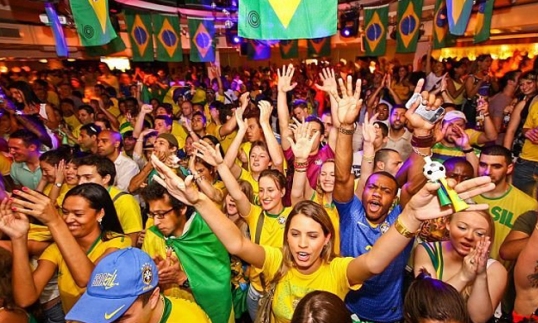The war against the World Cup and the Olympics
It must be strange for people who are used to see Brazilians as a smiley and youthful nation, proud of its country’s sporting exploits, to learn that most of them are hating to host the Olympics and the World Cup. While the costs are astronomical and no one knows for sure who actually benefits from these soulless mega-events centred on big business, very few countries get the privilege of hosting them and doing so usually is a matter of big national pride. Brazil seems to be an exception, and the question that comes to mind is why.
Ask the average Brazilian and he will give you the standard answer: The anger is because the government decided to throw money on these useless events instead of investing in hospitals, schools and infrastructure. You will also hear accusations of corruption together with some strange complaints about the ruling Workers Party’s (PT) programs for instituting financial help packages for poor families who send their children to school and for allowing Cuban doctors in the country to work in areas where urban middle class doctors refuse to go. What also will strike as strange is that the discontent took years to surface and that the apparent lack of investment in infrastructure has been happening since the 1970’s and only now have Brazilians awakened to this fact.
However, whoever bothers to study the numbers closer will be surprised at what they reveal. The 8 Billion Reais ( 3.6 billion US dollars ) spent of the construction of stadiums is tiny when compared with the 825 Billion Reais spent in the health system since the works began while the investment in education only in 2014 is predicted to be 115 Billion Reais. This is without taking into consideration that there will be a return on the investment in the both mega events, not only with the selling of tickets and with tourism but also in jobs and in the construction of infrastructure related to the events and the rippling effect that economic activities always have.
Havinf got this out of the way, the question remais, where does this anger come from? Ask an angry Brazilian if he would be happy if the Olympics and the World Cup would happen under another government and he will most probably say yes. He will also say probably say that, as a matter of principal, he has nothing against these mega-events taking in his country; what he doesn’t like is the government that is handling it nor the way it is doing it. Which kind of government would he like instead? Not sure, but definitely not this hateful PT one.
Based on the above, we can say with a degree of certainty that the problem is with the Government and not with the events per se. If this is so, we have to ask ourselves what is so evil in the ruling party that makes people take the streets, and almost dedicate their lives on a political crusade against it? Corruption? Well… this has been a national institution for at least the past eight decades, and is due to the way the Brazilian economy works. The engineer of this mechanism was the dictator Getulio Vargas who started ruling Brazil in the 1930’s, and who stayed in power for more than twenty years. His strategy was to set up a strong interventionist government that would support the country’s development together with local capital. Simply put, this means that the government would come up with big projects such as setting up oil companies, constructing roads, building hydroelectric plants, ports etc… which would open opportunities for Brazilian and sometimes for international investors as well as generate jobs and stimulate the economy as a whole. In broad line this is similar to the American President Roosevelt’s New Deal and to the Marshall plan in post-war Europe. This all sounds great in paper, and Vargas set it up with the best of intentions, but the system would generate unlimited possibilities for corruption.
The reason for this is that the result is that the most important economic deals in Brazil are related to the government and who is heading it makes a huge difference in terms of which project will go ahead and who benefit from the, ultimately who will get rich and who will not. It is important to remember this and that although the PT is a left wing government and defends state intervention, this system was in place long before it ever ruled Brazil.
Some people will also blame the police brutality, not only towards the protesters but also, and mainly, towards the poor population on a daily basis. The police is there to serve the state so, according to this way of thinking; the exaggerated use of force would reflect the willingness of the PT to transform itself in a left wing dictatorship. This is worthwhile examining; the brutality of the Brazilian police dates from before the PT’s ascension to power, actually of its older members experienced this brutality when they were in the opposition. The public security forces’ ethos is an inheritance of Brazil’s slavery past and has traditionally been brutal. Also, with the exception of the elite Federal Police, they are under the control of local governments. In this context, they are almost self-serving organizations with a history of protecting the local powerful, and that are very hard to control from the outside. In fact, their greatest fear is being supervised by outsiders who could make them respond for their excesses, or at least limit them. As a corporation, they are by no means immune from corruption and tackling them is a touchy business that any government is the world tries to avoid. In any case, it is very hard to sustain that the interests of the police and of the PT are the same, and it would be insane to suppose that the Brazilian police would collaborate in installing a Left Wing dictatorship in the country.
The strongest argument against the Government is that it is using both the Olympics and the World Cup as a political card. There is an undeniable truth in this, but we point out that any political party in the world would. If things go well the opposition will look stupid and Dilma’s popularity will be restored. We do not hear this accusation so much because the opposition is using these mega events as much as they can to do anti-PT propaganda. They are actually using all the weight they can to promote an anti-Government crusade that now resembles a public lynching. The attacks are constant in almost all the media, social media included, and are vicious.
There is a war going on against the World Cup and the Olympics. The opposition is frustrated in realizing that the Government has absorbed most of the punches and is still set to win the upcoming elections despite the economic downturn and all the PR efforts against it. This discontent has set a wide portion of the Brazilian society to want these two mega-events to fail. They prefer the country to look bad in the eyes of the world and investors to run away, rather than to give support to a government that may damage some of their private interests. This reminds us of the story of the genie who comes up to a man and says. “Tell me what you desire and it will be yours, but bear in mind that your enemy will have double”, the man responds “Take out one of my eyes”.
So what is it in this government that they dislike so much? It is our view that what angers the middle class is that after more than ten years in the government the ruling party has privileged the poor rather than business. This is serious, as it was the more instructed Brazilians who put the PT in power and not the lower classes. These voters feel entitled to policies in their favour. While there has been an undeniable improvement in the standards of living of the poorest segments, in many cases over-taxation has made the middle class see their standards of living lower. One issue that is emblematic of this anger is that now households must treat domestic workers as office workers and must pay regular taxes to employ them.
As in most countries under left wing governments, people are paying high taxes but are not seeing this money return to them in services or any other benefits. The construction of big stadiums and the hosting of big events has been an easy target to catalyze this anger.
For us there are deeper layers to this war on the Olympics and on the World Cup. Internationally this is a moment of great changes. We have seen the US and its allies fail to impress the world with their invasion of Iraq and their intervention in Afghanistan. Although they have moved away from their failed tactics of direct intervention, it seems obvious to us that they have tried to cling on to their receding supremacy by using indirect pressure. By this we mean that they have incited and made allegiances with locals to carry out their strategies. The recent examples are plenty, some with happy endings and others with tragic consequences: Libya, Tunisia, Turkey, Syria, Iran, Egypt, Ukraine, Venezuela… What all of these countries had in common was the threat of abandoning the American “mentoring” and ended up having “spontaneous” uprisings, which were supposed to be sympathetic to the Western dominance.
In a time when Brazil has abdicated its status of being one of the darlings of global investors to become closer to emerging Russia and China via the BRICS, it would be reasonable to expect that the West would react. Brazil is by no means an insignificant country and its success or its failure, the paths it chooses, will affect the world’s power brokerage and relevant on how the international economic machinery develops. It is reasonable to believe that it would not only be the Brazilian political opposition who would benefit from a possible failure in the two biggest sporting events in the World?
In its quest to “deliver the goods” Brazil has two unlikely allies FIFA and the IOC. Both of these organizations are aware that over-commercialization is turning their events dull and are making a great effort to maintain a business as usual approach for the events to be a success. The IOC has already threatened to make the next Olympics in London, which is highly improbable, but FIFA is the one who has more to lose, if a world cup in Brazil, the country of football, is a flop they will not be able to do much to keep the audiences for the next one.
All in all, the heated debate on the advantages of a state administered economy versus one ruled by “business” that will happen in Brazil during the interlude of FIFA’s World Cup and the 2016 Rio de Janeiro Olympics promises to be more interesting than what will happen inside the stadiums.





